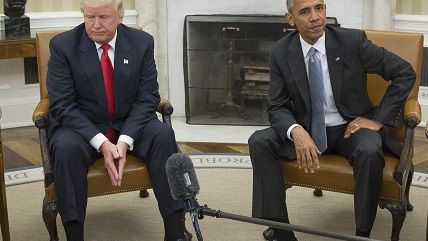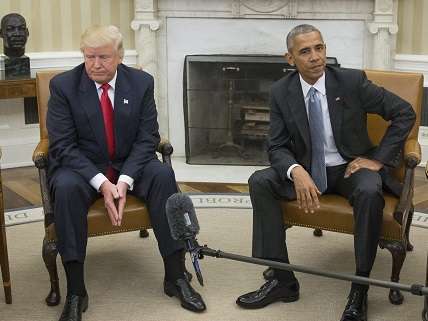President Obama Warns Trump About Executive Orders, Unilateral Foreign Policy and War Making
The president warns president-elect against following in his path.


President Obama warned President-Elect Trump about overusing executive orders to get his domestic agenda through. In an interview with NPR that aired today, Obama explained that "the legislative process is always better" than an executive order, "in part because it's harder to undo." He also expressed concern about the concentration of power in the presidency when it comes to the war on terror, insisting his administration has imposed "guard rails internally" where the Congress has failed to do so, but dismissed concerns about domestic power as the fault of Congress and the product of a necessary bureuacracy.
Obama admitted Trump was "entirely within his lawful power" to use executive orders in the same manner he has, but insisted that his "strong preference" was always to legislate where legislation is possible. "In my first two years, I wasn't relying on executive powers, because I had big majorities in the Congress and we were able to get bills done, get bills passed," Obama noted. "And even after we lost the majorities in Congress, I bent over backwards consistently to try to find compromise and a legislative solution to some of the big problems that we've got."
Obama brought up his immigration executive order, insisting he had only resorted to it after failing to get Congress to pass a bill, and pointed to the Senate passing a version of the bill as support for his executive order, which deprioritized deportations for illegal immigrants identified by the administration as low risk.
"So my suggestion to the president-elect is, you know, going through the legislative process is always better, in part because it's harder to undo," Obama said. Executive orders, as well as executive agreements like the Paris climate accord or the Iran nuclear deal, can be unilaterally dismantled just like they are unilaterally imposed. Obama called that "part of the democratic process," but the expansion of presidential powers through methods like the executive order is actually a subversion of the democratic process. While President Obama framed the legislative process as something he personally preferred to the executive order, the legislative process is not something that ought to be bypassed by executive action. That the last century has seen the legislative process increasingly ignored in favor of executive action and bureaucratic feat is a bug in the republican system, not a feature.
Asked directly whether he thought the presidency had grown too powerful, Obama separated foreign policy from domestic policy. He pointed out that the current military campaign against ISIS was being waged under the authority of the post-9/11 authorization for the use of military force. "The concern I have right now is because we're in a nontraditional war," Obama explained. "It's what we call the war on terrorism, although terrorism to some degree is a tactic. We're in a war against a non-state, a set of non-state actors that are operating in the shadows, are in nooks and crannies and crevices around the world."
"The danger is that over time, Congress starts feeling pretty comfortable with just having the president do all this stuff and not really having to weigh in," Obama continued, insisting on issues like drones and the National Security Agency, his administration had imposed guardrails internally where Congress has failed to do so—Obama did not articulate whether acting without the explicit authority of Congress was constructive in the first place.
On domestic policy, Obama resisted the idea that the presidency has grown too powerful. "The truth is that, you know, there hasn't been a radical change between what I did and what George Bush did and what Bill Clinton did and what the first George Bush did," Obama insisted. "It's, you know, the issue of big agencies, like the Environmental Protection Agency or the Department of Labor, having to take laws that have been passed, like the Clean Air Act, which is hugely complicated and very technical, and fill in the gaps and figure out our 'What does this mean and how do we apply this to new circumstances?' That's not new."
"Having federal bureaucracies and federal regulations, that's not new," Obama noted. What was new was "that Congress has become so dysfunctional, that more and more of a burden is placed on the agencies to fill in the gaps, and the gaps get bigger and bigger because they're not constantly refreshed and tweaked."
Obama is, in part, correct. George W. Bush was a disaster on federal regulations, just as he was a disaster on government spending. Yet the assumption that federal regulations are necessary, proper, or constitutional is a dangerous ones—by one account federal regulations have made Americans 75 percent poorer. The passage of complex laws that leave major fill-in-the-blanks for regulators are a big part of the problem, as is the drive to keep them "updated" without further action by Congress. What Obama misidentifies as "dysfunction" is actually a reflection of a politically divided and uncertain populace. Gridlock is good for government—and it's a feature, not a bug, of a republican system.
That point is missed by today's post-Trump chicken littles. Trump is precisely such a threat to the republican system because of the decades of work to dismantle it that preceded him. In an op-ed in The New York Times today, Paul Krugman explains "how republics end," drawing parallels with ancient Rome. Comparisons to Rome are nothing new. We did a segment on it on Judge Napolitano's Freedom Watch five years ago. Krugman notes Rome transformed from a republic into an empire in large part because of Romans privileging strong rulers to the rule of law. Such privileging in contemporary politics is nothing new. How exactly did Krugman think President Obama having "a pen and a phone" fit into a republican system? What did it say about the health of the republic?
The newfound concern for the Republic expressed by liberal thinkers like Paul Krugman ought to be welcomed. Recognizing how the republican system of government is being threatened is an important first step in preserving it—but such thinkers, who have too often been boosters of big government and unilateral executive action when they agree politically with the person holding the presidency, need to also recognize and acknowledge their role in getting us here. It's the best way to move forward if the concern for the republic is authentic, and not just more partisan posturing, as much of Republicans' concern for limited government has turned out to be now that they've got a strong man of their own on his way into the Oval Office.


Show Comments (183)